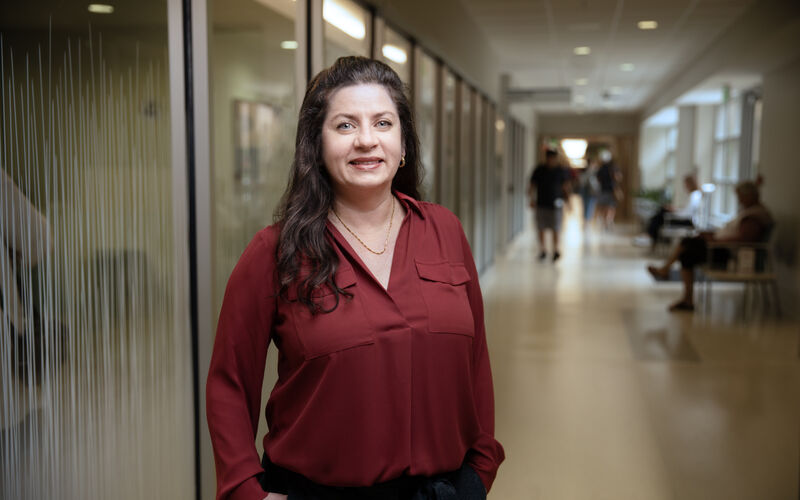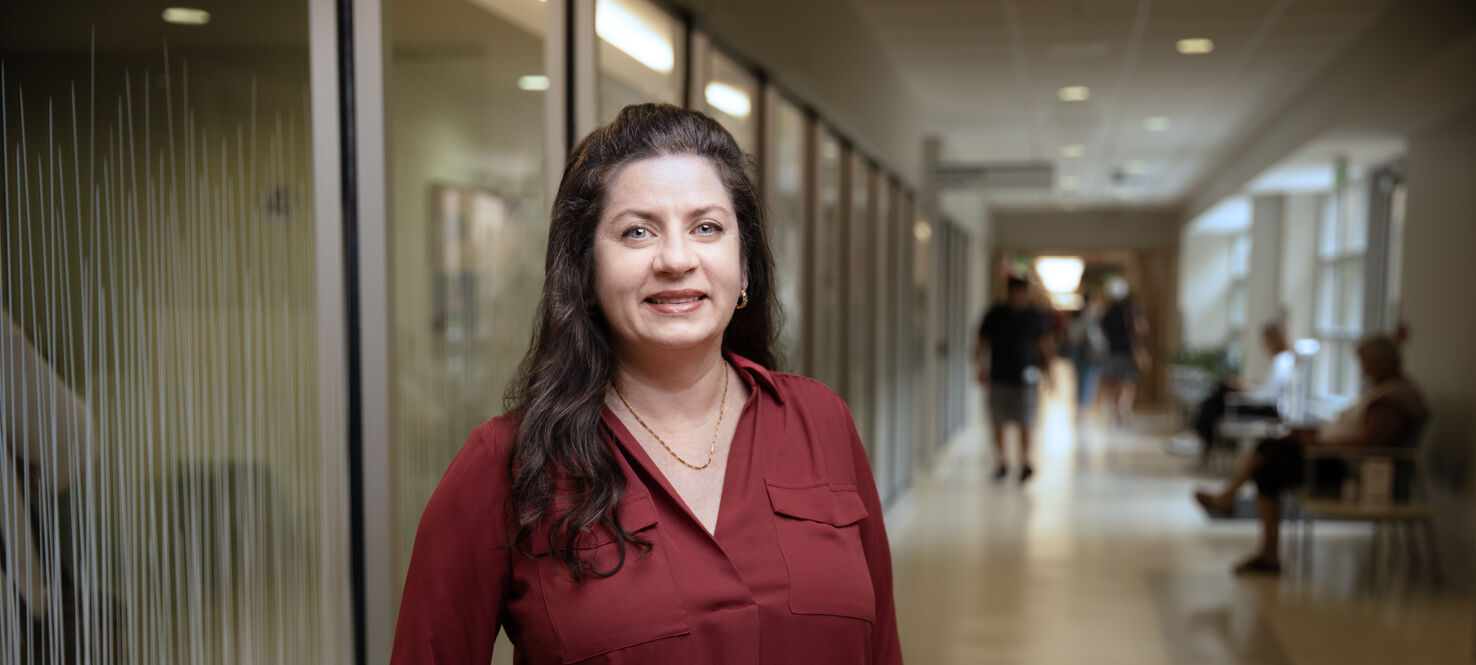Psychologist Finds Passion, Inspiration in Caring for Cancer Patients
SPECIAL SERIES: WOMEN IN ONCOLOGY
Women faculty at Moffitt Cancer Center come from different backgrounds around the globe. Their areas of research and clinical care span the entire cancer continuum, including clinical science and trials, basic science, epidemiology, health outcomes, medical physics and more. Community involvement and mentorship among faculty are foundational, and we celebrate the essential roles women play in making a difference at the cancer center and in society.
Meet Dr. Lora Thompson
Lora Thompson, PhD, earned her doctorate in psychology from the University of South Florida, followed by a postdoctoral research fellowship in psychosocial oncology at Moffitt Cancer Center/USF. Since 2007, she has been a part of the behavioral medicine team providing psychological assessment and interventions to support patients coping with the emotional challenges of cancer diagnosis, treatment and survivorship. Her clinical focus includes managing symptoms such as depression, anxiety and sleep difficulties, while enhancing patients’ coping skills. Thompson also leads Moffitt’s Integrative Medicine Service, offering therapies like yoga, meditation, massage and acupuncture to improve overall well-being. Her research and clinical interests revolve around improving quality of life for patients by addressing emotional concerns and providing holistic care options. Thompson is committed to empowering patients to find resilience and positivity as they navigate the challenges of their cancer journey.
How did your journey at Moffitt begin, and what role has mentorship played in your career?
My journey at Moffitt began in 1995 when I graduated with a degree in psychology from the University of Florida. I returned to Tampa, my hometown, unsure of what to do next and discovered an opportunity at Moffitt through Paul Jacobsen, PhD, the first head of the psychosocial department. I applied for a research assistant role, and that position turned into years of invaluable mentorship from Jacobsen. He guided me through my doctoral program at the University of South Florida and helped me to develop the research and clinical skills needed to be a psychologist. Jacobsen played a key role in shaping my career, showing me firsthand how a psychologist can make an impact on the well-being of cancer patients. With his mentorship, I developed a passion for the field and was able to stay at Moffitt, taking on a clinical role in what is now called the Supportive Care Medicine Department. It’s been an incredible journey watching Moffitt grow from a single campus to the large institution it is today. I’m grateful for the guidance that helped me along the way.
Was psychology always your calling? What first sparked your interest in the field?
Actually, no. I didn’t have a clue as a child that I would end up as a psychologist. I went through phases where I thought I wanted to be an architect or even a lawyer. It wasn’t until I began my college years that I found psychology interesting. I volunteered a lot, especially with children, and it led me to explore psychology further. When I started taking classes, I realized I was more interested in the human mind and behavior than in basic sciences. That curiosity eventually led me to psychology.
Oncology, on the other hand, was something I kind of fell into while searching for my first job after college. I became fascinated by the intersection of health and psychology. Once I began working with cancer patients, I knew it was where I wanted to be.
What do you find most rewarding about your work in oncology?
The most rewarding part about my work is helping people find hope and positivity, even when they are facing the most difficult challenges. In psychosocial oncology, we don’t deliver the treatments that lead to a cure, but we can improve patients’ quality of life, help them manage their emotions and give them tools to make their journey more bearable. Seeing a patient smile or find joy in their life, despite their circumstances, is what keeps me going.
Can you tell us about a patient experience that had a profound impact on you?
It’s hard to pinpoint just one patient because every one of them teaches me something new. What stands out to me most is the resilience that people show when faced with a life-threatening illness. I’ve had the privilege of working with patients who, despite knowing their time is limited, find ways to enjoy life through their family, their hobbies or even their pets. It’s moments like those that remind me why I do what I do.
How have you seen cancer care evolve over the years?
Cancer care has changed so much in the time I’ve been here. There’s a much greater focus now on quality of life and mental health, which I think is incredibly important. The integration of supportive care and psychology into the treatment plan has grown, and we’re seeing more patients who benefit from these services. There’s also been a huge shift toward personalized care, which allows us to better meet the needs of each individual patient.
What advice do you have for the next generation of doctors and psychologists in oncology?
My advice would be to stay open to learning. The field of oncology, particularly supportive care, is always evolving. There’s more emphasis now on technology and data, which can be overwhelming, but it’s crucial to adapt. Another piece of advice is to focus on building relationships with patients. Oncology can be emotionally taxing, but the relationships you build with your patients are what will keep you grounded and motivated.
What are you most excited about in your work right now?
One of the things I’m most excited about is my role in leading Moffitt’s integrative medicine team, offering services like yoga, meditation and massage therapy. This has given me the opportunity to be involved in program development and education in addition to helping me develop leadership skills. These services expand our ability to address the physical and emotional aspects of cancer and speak to our goal of offering holistic care to our patients. My hope is that I can continue to see this program grow to reach more patients.
What are your hobbies?
Traveling is my biggest passion. I love exploring new places and learning about different cultures. I just returned from Sicily, which was incredible because it’s where my family is from. I also enjoy cooking, especially Italian food. It’s a big part of my heritage. It’s a great way to unwind and connect with family.




